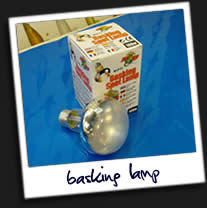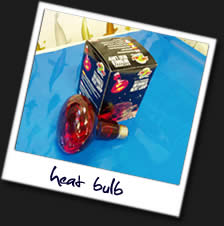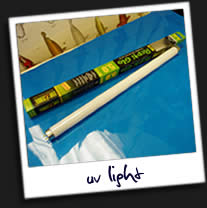www.reptiles-info.co.uk
Reptile Lighting:
Reptile lighting is an extremely important factor in the success of keeping a pet reptile. It can be one of the main reasons to ensure your reptile has a long and healthy life, however there are many factors involved in the process of lighting a reptiles housing. In order to help you through the process of lighting your reptiles housing we have provided a guide to reptile lighting.

Basking Lamps:
Basking lamps are similar to a spot lamp in appearance. They differ in that the construction of the lamp provides for a concentrated vertical beam of heat energy. Standard spot lamps allow dissipation of heat over a wider area. Basking lamps, therefore, will concentrate their heat energy into a narrow band and reptiles will sit underneath this beam to absorb heat. The lamps are available as a standard lamp or as an infrared version suitable for nocturnal specieslaThese lamps commonly terminate in a screw thread and need to be fitted to a screw fitting lamp holder but unlike ceramic elements, this holder can be of a standard type and does not need to be heat resistant. They are available in a range of wattages. As a very basic guideline use 40 to 60 watt lamps for vivariums up to 30 inches (75cm), 100 watt for 36 inch (90cm) vivariums and the 150 and 200 watt versions for larger systems. Account should also be made for heat loss, i.e. cold and drafty rooms.

Infrared bulbs:
Infrared bulbs are used to illuminate vivariums containing nocturnal species. The light emitted by them does not disturb the reptile, as it does not perceive the wavelength emitted as daylight, but nonetheless, illumination is sufficient for viewing purposes. Infrared spotlights are also available and produce a localised beam of heat as well as providing a light source.

UV Light:
Ultraviolet light is important in the production of vitamin D3, which is necessary for calcium metabolism.Vitamin D3 is produced in the skin with exposure to UV light (from sunlight). While vitamin D3 can be supplemented in the diet, it appears some reptiles, such as iguanas, make better use of vitamin D3 produced within their bodies than that provided in vitamin supplements. Sunlight is an impractical source of UV for most owners (UV light is blocked by glass, so exposure through windows is not a viable option). UV can be provided by special light bulbs.


